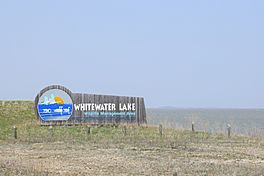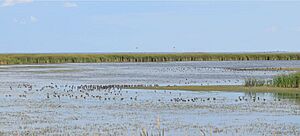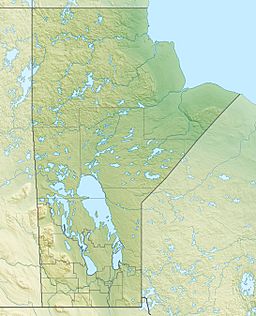Whitewater Lake, Manitoba facts for kids
Quick facts for kids Whitewater Lake |
|
|---|---|

The sign at the Whitewater Lake WMA on the south side of the Lake.
|
|
| Location | Municipality of Deloraine – Winchester / Municipality of Boissevain – Morton rural municipalities, Manitoba, Canada |
| Coordinates | 49°14′17″N 100°19′25″W / 49.23806°N 100.32361°W |
| Lake type | Endorheic basin |
| Basin countries | Canada |
| Surface area | 139.75 square kilometres (53.96 sq mi) |
| Average depth | 2 metres (6.6 ft) |
| Surface elevation | 1,628 ft (496 m) |
Whitewater Lake is a special lake in Manitoba, Canada. It is located between the towns of Boissevain and Deloraine. This lake is unique because water flows into it but does not flow out naturally. This type of lake is called an endorheic basin. It is more like a big marsh than a typical deep lake.
Long ago, people called it White Lake. This was because white salt patches appeared when the water dried up. Whitewater Lake is usually about 22,000 acres big. It is also quite shallow, reaching depths of only about 2 meters (6.5 feet). Several small streams flow into the lake from the Turtle Mountains.
Contents
About Whitewater Lake
Whitewater Lake is an alkaline lake. This means its water has a higher pH level, similar to baking soda. Because of this, the lake has dried up completely several times in the past. Some of these dry periods include 1857, 1913–1915, 1934-1940, and 1989–1992.
Protecting the Lake
To help the lake stay healthy, Ducks Unlimited Canada started working with Manitoba Conservation in 1989. They also partnered with other groups. Over the years, they invested more than two million dollars. Their goal was to make sure the lake would always have water, even during dry times.
They built dikes and special water control structures on the east side of the lake. These structures help keep water in the lake. This way, the lake can stay full even when there is not much rain.
Current Water Levels
In 2016, Whitewater Lake reached a high level of 1633 feet. This was five feet above its usual long-term average. These high water levels have caused the lake to spread onto nearby farmland. They have also led to significant wearing away of the dike and park areas on the lake's southeast side.
Whitewater Lake Wildlife Area
The Whitewater Lake Wildlife Management Area (WMA) is a large protected area. It covers 8,257 hectares (about 20,400 acres). This area includes Whitewater Lake itself. It also has a special marsh east of the lake that is managed for wildlife.
There is a great spot to watch wildlife at the southwest corner of the managed marsh. This viewing site helps people see the many animals that live here.
Important Bird Area

Whitewater Lake is very important for birds. Bird Studies Canada has named it a globally significant Important Bird Area (IBA). This is because huge numbers of waterfowl and shorebirds gather here during their migration.
Bird Migration and Nesting
During the fall migration, many different kinds of waterfowl visit the lake. This includes a large number of Snow geese and Tundra swans. When water levels are low, the lake becomes a major stop for shorebirds. In fact, it has the largest groups of shorebirds in southern Manitoba. For example, in 1988, 10,000 White-rumped sandpipers were counted here. This was 2.5% of all known White-rumped sandpipers in the world at that time!
Whitewater Lake is also important for birds that nest there. It is a nationally significant nesting site for Black-crowned night herons. About 1.7% of all Black-crowned night herons in Canada nest at this lake. Other important nesting birds include Franklin's gulls and Eared grebes.
 | William L. Dawson |
 | W. E. B. Du Bois |
 | Harry Belafonte |


